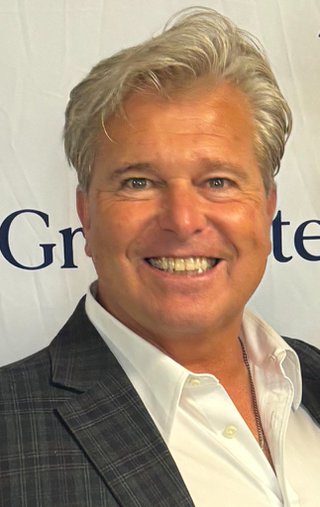Located in the former Corner Coffee House space, the multi-use café and reflection center is slated to open in February, with the gallery open by appointment beginning January 20.
The Garden (100 N. Florissant Road) is slated to open next month in the space that previously housed the Corner Coffee House. The Garden will offer a coffee shop, in-house and outdoor dining options, an art gallery, and gathering spaces for reflection and conversation. The partners behind the new concept, who connected via separate entrepreneurship endeavors through Benedictine College in Kansas, are ramping up to open a unique enterprise centered on hospitality. Here’s what to know before you go.
The Menu

Courtesy of Tim Larson
The allure of a great cup of coffee is the first of many reasons to visit The Garden.
Jonathan Thomas, president and CEO of Civil Righteousness, the driving force behind the venue, has spent years learning about world-class coffee from mentors such as Jamie Jeschke at La Cosecha Coffee Roasting, the Garden’s roasting partner. “We are incrementally developing a robust coffee program that highlights and celebrates the stories of the people fromthe places of origin where our coffee is being sourced,” Johnson says. The initial drink menu will feature an Americano, cappuccino, lattes (mocha, vanilla, caramel, and chai), plus an assortment of fine teas.
The Garden Café’s baristas did a test run at the fully renovated space during a soft openingevent in December and will announce the full menu of beverages and baked goods soon.
On the culinary side, The Garden Kitchen is a hospitality innovation hub that offers industry education and commissary kitchen access to small businesses and entrepreneurs. For day-to-day operations, Civil Righteousness has partnered with Soulcial Kitchen, which has been helping startup hospitality businesses—especially food trucks—succeed on its Swansea campus since 2021 and more recently on its Alton campus.
The Garden’s food offerings will be twofold: an in-house menu from a team focused on fresh ingredients in healthy dishes and a rotating lineup of food trucks in the parking lot. (For menu details, keep an eye on The Garden, Civil Righteousness and Soulcial Kitchen social feeds.)

Courtesy of Man That’s Good Mobile
Willis Mosby
The in-house culinary team’s lead mentor is longtime chef Willis Mosby, who also operates the Man That’s Good Mobile food truck, which will make regular appearances in the outdoor lineup. The food truck’s menu features sandwiches, wings, fries, and the show-stopping, hand-pressed Big Mouth Burger (with bacon, lettuce, tomato, pickle, American and pepper Jack cheeses, and Mosby’s famous house-made onion jelly).
Thomas says The Garden welcomes inquiries about culinary collaborations because the process of seeking and finalizing partnerships will be ongoing.
The Mission
The Garden Kitchen addresses economic insecurity and food inequity in North County in a couple of ways. A key feature is the Spark Tank mentorship program. Each Spark Tank cohort has 28 local entrepreneurs who meet weekly at The Garden for base-level business education, taught by Benedictine College School of Business professors and other content experts. The new and/or aspiring food truck owners also receive lessons about entrepreneurial thinking and analytical skills and study menu creation, supply sourcing, food safety, cooking modalities, customer satisfaction, and more.
Hospitality-related small businesses also have the opportunity for rental access to The Garden’s commissary kitchen at hourly, daily, and monthly rates.

Courtesy of Soulcial Kitchen
In addition, The Garden is the 29th location for the Currency of Caring program, through which patrons purchase tokens that can be redeemed for hot, high-quality meals served with dignity and respect by participating restaurants. John and Holly Michel created Currency of Caring in tandem with Soulcial Kitchen as part of their mission to strengthen communities and increase the availability of fresh food in under-resourced communities. Its tokens have been redeemed for more than 20,000 meals.
John is excited to be involved with a space that’s so focused on hospitality and interpersonal connection, both of which are central to his nonprofits as well. “Food is the ultimate peacemaker and timeless unifier,” he says. “The simple act of sharing a meal is a form of community building.”
Eventually, Thomas plans to further emphasize that aspect of The Garden’s mission by launching The Table, a speaker series featuring meals by renowned chefs. The food will be followed by facilitated conversations where participants process the speaker’s remarks with their fellow diners. Civil Righteousness has more than 10 years of experience facilitating these types of conversations in other parts of the U.S. and overseas through its seven-member staff and its network of more than 400 volunteer local organizers.
The Atmosphere

Courtesy of Tim Larson
Customers who are intrigued by The Garden’s mission and seek to go beyond a quick cup of coffee have several options. First and foremost is the Imago Dei Gallery, a contemplative room that Thomas describes as part art exhibition, part museum. Each display is designed to have an element of contemplation or an opportunity for physical interaction. The gallery will be open by appointment beginning January 20, with expanded hours once the rest of the venue opens.
The name Imago Dei, which means “in the image of God,” connects to the message of Dr. Martin Luther King Jr. and his historic civil rights movement, Thomas explains. “We are all equal. We are all beautiful. We are all bearers of divine beauty, and we need to see each other through that lens as we build our society.”
The current exhibition includes both local and national artists, whose work is displayed within the context of the civil unrest after the death of Michael Brown in 2014. “There has been no interpretation center in Ferguson to learn about St. Louis history and what led up to the Mike Brown moment,” Thomas says. Through Civil Righteousness’ peacemaking and reconciliation work, he regularly receives calls and messages from people all over the country who would like to learn about Ferguson. He believes it is important to offer a space for learning and reflection for visitors as well as local residents.
In addition to the Imago Dei Gallery, customers can watch and listen to Civil Righteousness’ podcasts and videos, which are produced in The Garden Studio. Future community programming will also be hosted there. They can also view episodes of Food Is Love, an Emmy-winning television program from host Lasse Sorensen. Michel heads Food Is Love’s nonprofit community impact efforts.

Courtesy of Jonathan Thomas
Jonathan Thomas with wife, Mollie, and daughter, Mira
“Wherever there is great conflict, there is opportunity for great solutions to come forth,” Thomas says. But, he adds, “New ideas can be very scary, especially if you don’t have the grid for it, and especially in a place where so many conversations that stir up hard things have not been done well.”
That’s why he is determined to bring a tone of reconciliation to the reopening of The Corner Coffeehouse, which closed abruptly in 2017, after hosting many meetings, interviews, and conversations during and after the unrest.
The Backstory
After buying a home in Ferguson in 2017, Thomas drove by the closed coffeehouse every day. He kept hoping someone would purchase and reopen the property. “It was the known point of connection and convergence in the city,” he says. People from every socioeconomic demographic met there, whether to conduct business or simply hang out.

Courtesy of Tim Larson
Jonathan Thomas
Finally, in 2019, Civil Righteousness took action. “I had no experience in coffee or the food industry,” Thomas says. “My background is in ministry but also peacemaking and community development. I thought if we could bring back great specialty coffee that is accessible and affordable for everyone, we could create a space that draws people from other parts of the city to want to come to Ferguson.”
After the purchase, nothing went as planned. The building needed major repairs. The pandemic hit. Prices of construction supplies skyrocketed. Contractors changed. The project’s donors became reluctant about their financial commitments as timelines dragged out.
“It’s been quite an interesting journey as we hit obstacle after obstacle,” Thomas says. Yet he is reflective even in the face of adversity. “For me, our journey with the space is really a picture of some of the challenges we’ve faced as a nation culturally and as a region politically,” he continues. “That’s what is exciting to me—we all have stories filled with challenges, but we can create a space where we can join together and find that thread of pain and progress together. That’s what has motivated me to create a space of hope.”
Meanwhile, Michel heard about Civil Righteousness’ work via Benedictine College and Spark Tank. He immediately understood Thomas’ motivation. “My heart is to show food is love and the ultimate unifier and peacemaker,” Michel says. “His heart is in how you can use art and conversation to spark healing.”

Courtesy of Soulcial Kitchen
John Michel
Michel, a retired brigadier general with extensive experience in logistics “and turning around organizations that were not performing as well as they potentially could have,” had studied programs that promote social transformation while earning his doctorate. “We have a tendency in society to look past broken things,” he says. “We look past broken buildings and build new ones. We do the same thing with people a little bit.”
Thomas acknowledges that it can be uncomfortable to shift society’s gaze. Not everyone feels there’s a need for robust reconciliation conversations in St. Louis. Some would prefer to just move forward. But through Civil Righteousness’ work in other places, he has seen how fears melt when people experience healing. He has been mentored by reconciliation leaders in countries including Rwanda, South Africa, and Australia, and he will integrate elements of their models at The Garden.
“What we’re doing is outside the box—and it has to be,” he says. “We can’t do the same things as in the past and expect different results.”

